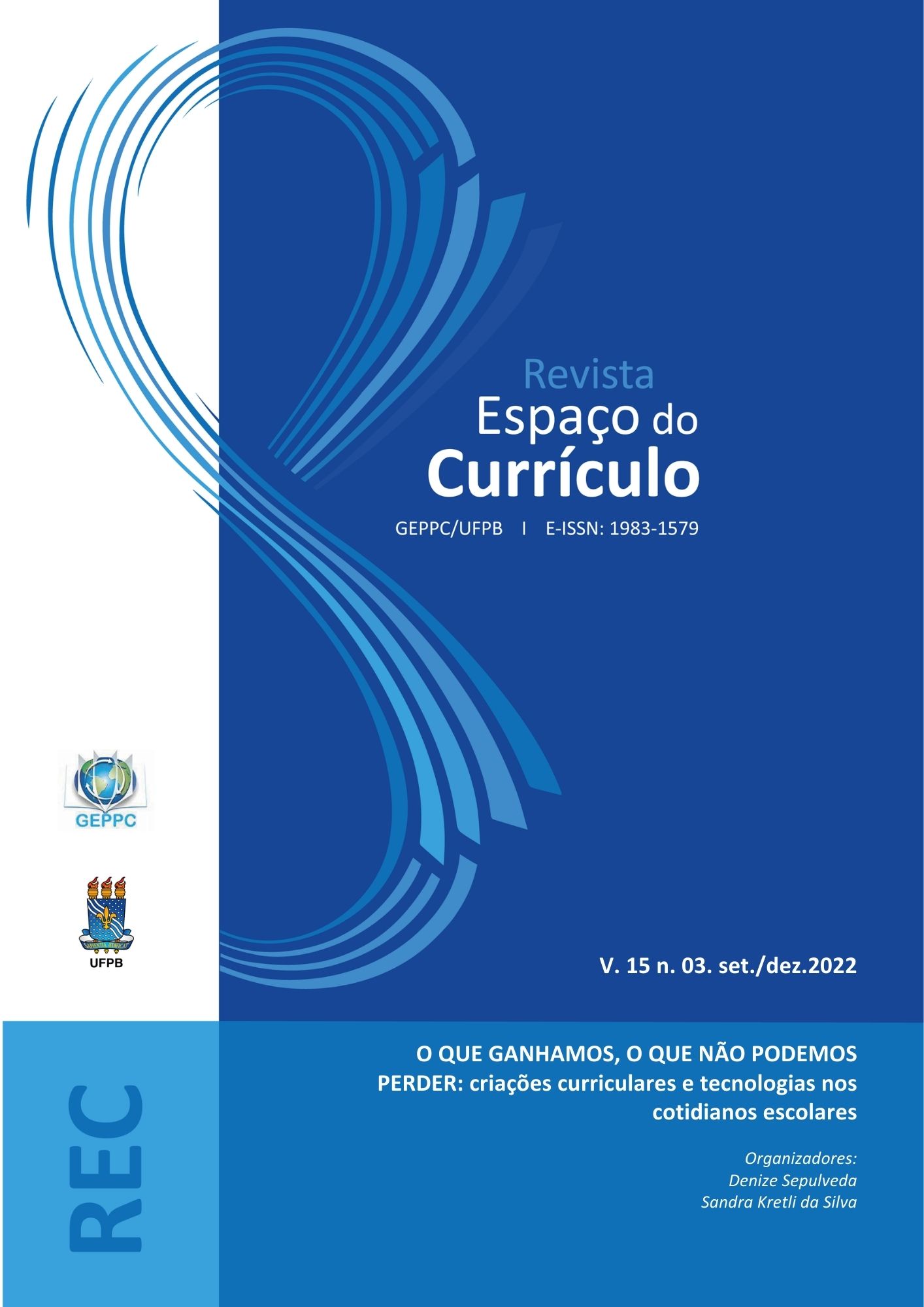CURRICULUM EXPERIENCED BY LICENSEES
the educational use of TDIC
DOI:
https://doi.org/10.15687/rec.v15i3.64667Keywords:
Graduation in Mathematics, Digital Enculturation, TPACKAbstract
The intensive use of digital Technologies in daily life, especially by young people, collaborates in the demand that, in the school environment, teachers add Digital Information and Communication Technologies (DICT) to teaching methodologies to develop the curriculum. Thus, the objective of the research was to identify characteristics of the curriculum experienced by undergraduate students, in relation to the DICT in Mathematics Teacher Education. The participants were undergraduate students from public institutions in Mato Grosso do Sul, who answered online questionnaires using the Google form. When analyzing the data, we use Automated Content Analysis and Statistical Analysis. The data showed that the Mathematics Teacher Education curricula slowly inserted/integrated DICT into the teaching and the learning processes, slowly advancing towards Digital Enculturation. The COVID-19 pandemic sped up this walk, turning it into a marathon. The insertion/integration of the DICT caused changes in the curriculum of these Degrees, which was pointed out by the finalist students. In conclusion, the curriculum experienced by undergraduate students was modified, with the educational use the of the TDIC, to enable the construction of the TPACK, containing characteristics of a web curriculum to form digital enculturators, in different local context of the State of MS.
Downloads
Metrics
References
ALMEIDA, M. E. Integração currículo e tecnologias: concepção e possibilidades de criação de web currículo. In: ALMEIDA, M. E.; ALVES, R. M.; LEMOS, D. Web currículo: Aprendizegem, pesquisa e conhecimento com o uso de tecnologias digitais. Rio de Janeiro: Letra Capital, 2014. p. 20-38.
BARAN, E.; BILICI, S. C.; TONDEUR, J. Investigating the impact of teacher education strategies on preservice teacher TPACK. British Journal of Education Technology, v. 50. Ed. 1, pp. 357-370, 2017.
BARDIN, L. Análise de conteúdo. Lisboa: Edições 70, 2011.
BISHOP, A. J. Mathematical enculturation: A cultural perspective on mathematics education. Dordrecht: Kluwer Academic Publishers, 1991.
CRESWELL, J. W. Projeto de Pesquisa: métodos qualitativos, quantitativos e mistos. Porto Alegre: Artmed, 2007.
DORATIOTO, F. Maldita Guerra: nova história da Guerra do Paraguai. São Paulo: Companhia das Letras, 2002.
GORAYEB, A.; MEIRELES, A. J. A. Cartografia Social vem se consolidando como instrumento de defesa de direitos. Rede Mobilizadores, 2014. 18.
GRIMMER, J.; STEWART, B. M. Text as data: the promise and pitfalls of automatic content analysis methods for political texts.
GUTIÉRREZ-FALLAS, L. F.; HENRIQUES, A. Prospective Mathematics Teachers´ TPACK in a context of a teacher education experiment. Revista Latinoamericana de Investigación en Matemática Educativa-RELIME, v. 23, Ed. 2. Pp. 175-202, 2020.
KURTZ, A. Digital Enculturation in tile new communication technology curriculum. 17th ICTE Tampa, Flórida, EUA, 13 Out 1999. 42.
LOPES, R. P.; FÜRKOTTER, M. Do Projeto Pedagógico à aula universitária: aprender a ensinar com TDIC em cursos de Licenciatura em Matemática. Educação em Revista, v. 36. Belo Horizonte, 2020. https://doi.org/10.1590/0102-4698220954
MARTINS, L.; NONATO, K. J.; LOBO DA COSTA, N. M. Análise de Conteúdo Automatizada como metodologia em pesquisas na área da Educação Matemática. In: CONGRESSO IBERO-AMERICANO DE EDUCAÇÃO MATEMÁTICA, 9., 2022, São Paulo, Brasil: Universidade de São Paulo, 2022.
MISHRA, P.; KOEHLER, M. Techonological Pedagogical Content Knowledge: a Framework for Teacher Knowledge. Teachers College Record, v. 108, p. 1017-1054, 2006.
NONATO, K. J.; LOBO DA COSTA, N. M. Contexto Curricular das Licenciaturas em Matemática. In: Anais do XIV Encontro Nacional de Educação Matemática, 2022.
NONATO, K. J.; LOBO DA COSTA, N. M. Vozes de coordenadores de curso a Prática Pedagógica e o Currículo com as Tecnologias Digitais nas Licenciaturas em Matemática. In: Jornal Internacional de Estudos em Educação Matemática, v. 15, n, 2, pp. 142-153. 2022a.
NONATO, K.; LOBO DA COSTA, N. M. Rompendo Barreiras: Desafios dos Professores das Licenciaturas em Matemática para Integrar Tecnologias Digitais ao Currículo. Educação Matemática Sem Fronteiras: Pesquisas Em Educação Matemática, v. 3, n. 2, p. 194 - 214, 23 dez. 2021.
PAVLÍčEK, A. Social media–the good, the bad, the ugly. IDIMT-2013, Prague, Czech Republic, 2013. 139-149. Disponível em: <https://idimt.org/wp-content/uploads/proceedings/IDIMT_proceedings_2013.pdf#page=141 >. Acesso em: 19 out 2022.
RATINAUD, P. IRAMUTEQ: Interface de R pour les Analyses Multidmensionnelles de Tesxtes et de Questionnaires. Austria, 2009.
SACRISTÁN, J. G. O Currículo: uma reflexão sobre a prática. 3ª. ed. Porto Alegre-RJ: Artmed, 2000.
SOUSA, I. O.; MELQUES, P. M.; GRAZZINOLI, R. X. TDIC na Perscpectica do Coensino: Blended Learning como estratégia de interatividade. CRUZ, F. A. O. Et al. Do Campo para a Cidade: propostas para uma Educação Inclusiva. Editora Santorini: São Paulo, 2021.
TARDIF, M. Saberes Docentes e Formação Profissional. Petrópolis-RJ: Vozes, 2008.
ZABALA, A. A prática educativa: como ensinar. Porto Alegre: ArtMed, 1998.
Downloads
Published
How to Cite
Issue
Section
License
Copyright (c) 2022 Curriculum Space Journal

This work is licensed under a Creative Commons Attribution 4.0 International License.
By submitting an article to Curriculum Space Journal (CSJ) and having it approved, the authors agree to assign, without remuneration, the following rights to Curriculum Space Journal: first publication rights and permission for CSJ to redistribute this article. article and its metadata to the indexing and reference services that its editors deem appropriate.
















